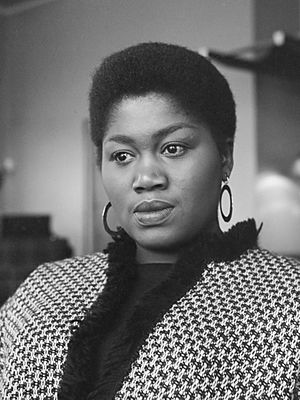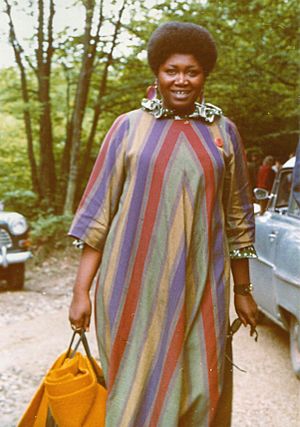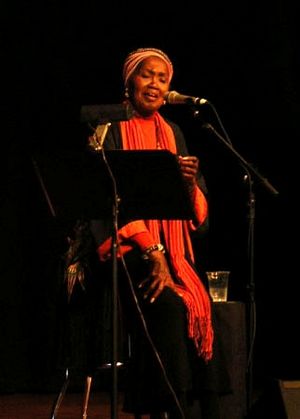Odetta facts for kids
Quick facts for kids
Odetta
|
|
|---|---|

Odetta in 1961
|
|
| Background information | |
| Birth name | Odetta Holmes |
| Also known as | Odetta Gordon, Odetta Felious |
| Born | December 31, 1930 Birmingham, Alabama, U.S. |
| Died | December 2, 2008 (aged 77) New York City, New York, U.S. |
| Genres | Folk, blues, spirituals |
| Occupation(s) | Singer, actress, guitarist, lyricist, activist |
| Years active | 1944–2008 |
| Labels | Fantasy, Tradition, Vanguard, RCA Victor, MC, Silverwolf, Original Blues Classics |
| Associated acts | Lead Belly, Janis Joplin, the Staple Singers, Bessie Smith, Bob Dylan, Joan Baez, Bonnie Raitt, Harry Belafonte |
Odetta Holmes (born December 31, 1930 – died December 2, 2008), known simply as Odetta, was an American singer, actress, and guitarist. She was also a strong voice for civil rights and human rights. Many people called her "The Voice of the Civil Rights Movement."
Odetta sang many types of music, including American folk music, blues, and spirituals. She was a very important person in the American folk music revival during the 1950s and 1960s. She inspired many famous folk singers like Bob Dylan, Joan Baez, Mavis Staples, and Janis Joplin. Time magazine even said that Rosa Parks was her biggest fan. Martin Luther King Jr. called her "the queen of American folk music."
Contents
Biography
Early Life and Career Beginnings
Odetta Holmes was born in Birmingham, Alabama, on December 31, 1930. Her father died when she was very young. In 1937, she and her mother, Flora Sanders, moved to Los Angeles. When her mother married Zadock Felious, Odetta took his last name.
In 1940, Odetta's teacher noticed her amazing singing voice. Odetta started training to sing opera when she was 13. She went to Belmont High School and later studied music at Los Angeles City College. To support herself, she worked as a domestic worker. Her mother hoped Odetta would become an opera star like Marian Anderson. But Odetta felt that a "large black girl" like her would not get to sing at the Metropolitan Opera.
In 1944, Odetta began her professional career in musical theater. She worked for four years with the Hollywood Turnabout Puppet Theatre. In 1949, she joined a touring musical show called Finian's Rainbow.
While touring with Finian's Rainbow, Odetta met many young folk singers in San Francisco. After 1950, she decided to focus on folk singing. She became famous by performing at clubs like the Blue Angel in New York City and the hungry i in San Francisco. In 1954, she recorded her first album, Odetta and Larry, with Larry Mohr.
Odetta then started her solo career. She released albums like Odetta Sings Ballads and Blues (1957) and At the Gate of Horn (1957). Her album Odetta Sings Folk Songs was one of the most popular folk albums in 1963.
In 1959, she appeared on a TV special called Tonight with Belafonte. She sang "Water Boy" and a duet with Harry Belafonte, "There's a Hole in My Bucket".
Civil Rights Movement and Wider Recognition
In 1961, Martin Luther King Jr. called Odetta "The Queen of American Folk Music." That same year, Harry Belafonte and Odetta had a hit song in the UK called "There's a Hole in the Bucket."
Odetta is well-remembered for her performance at the March on Washington for Jobs and Freedom in 1963. This was a huge civil rights event where she sang "O Freedom." She said her role in the civil rights movement was like being "one of the privates in a very big army."
Odetta started to try different musical styles. She added band arrangements to some of her albums instead of just playing alone. She released more "jazz" style music on albums like Odetta and the Blues (1962) and Odetta (1967). She gave a memorable performance at the Woody Guthrie memorial concert in 1968.
During this time, Odetta also acted in several films. These included Cinerama Holiday (1955), Sanctuary (1961), and The Autobiography of Miss Jane Pittman (1974). In 1961, she was in an episode of the TV show Have Gun, Will Travel.
Odetta was married twice.
Later Career and Awards
In May 1975, Odetta appeared on a TV show called Say Brother. She sang "Give Me Your Hand" and talked about her spiritual beliefs, her music, and her work in civil rights.
In 1976, Odetta performed in an opera called Be Glad Then, America. This was for the U.S. Bicentennial, celebrating 200 years of America.
From 1977 to 1997, Odetta released two albums: Movin' It On in 1987 and a new version of Christmas Spirituals in 1988.
Starting in 1998, she began recording and touring again. Her album To Ella (1998) was a tribute to her friend Ella Fitzgerald. She then released three more albums: Blues Everywhere I Go (2000), which was nominated for a Grammy Award; Looking for a Home (2002), a tribute to Lead Belly; and Gonna Let It Shine (2007), a live album of gospel songs, also nominated for a Grammy. These new recordings and tours led to her appearing on many other artists' albums.
On September 29, 1999, President Bill Clinton gave Odetta the National Endowment for the Arts' National Medal of Arts. In 2004, she received the "Visionary Award" at the Kennedy Center. In 2005, the Library of Congress honored her with its "Living Legend Award."
In September 2001, Odetta performed with the Boys' Choir of Harlem on the Late Show with David Letterman. This was the first show after the September 11 events. They sang "This Little Light of Mine".
The 2005 documentary film No Direction Home, directed by Martin Scorsese, showed how much Odetta influenced Bob Dylan. The film included old clips of Odetta singing "Waterboy" and "Mule Skinner Blues."
In 2006, Odetta toured the U.S., Canada, and Europe. She was also a main speaker at a human rights conference in Latvia. In December 2006, the Winnipeg Folk Festival gave her a "Lifetime Achievement Award." In February 2007, she was named "Traditional Folk Artist of the Year" by the International Folk Alliance.
On March 24, 2007, a special concert honored Odetta. Many famous artists performed or sent video tributes, including Pete Seeger, Harry Belafonte, and Joan Baez.
In 2007, Odetta's album Gonna Let It Shine was nominated for a Grammy. She also completed a big tour called "Songs of Spirit."
Final Tour and Passing
On January 21, 2008, Odetta was the main speaker at a Martin Luther King Jr. event in San Diego. She then performed concerts in California and appeared on PBS-TV's The Tavis Smiley Show.
On May 8, 2008, another tribute night was held for Odetta in New York City. Many musicians performed to honor her.
In summer 2008, at 77 years old, Odetta started a North American tour. She sang from a wheelchair. Her songs often included "This Little Light of Mine", Lead Belly's "The Bourgeois Blues", and "Sometimes I Feel Like a Motherless Child".
She performed at The Bitter End in New York City on June 30, 2008. Her last big concert was in San Francisco's Golden Gate Park on October 4, 2008, for the Hardly Strictly Bluegrass Festival. Her very last performance was in Toronto on October 25.
In November 2008, Odetta's health got worse. She hoped to perform at Barack Obama's inauguration in January 2009. However, she died of heart disease on December 2, 2008, in New York City. She passed away 29 days before her 78th birthday.
A memorial service for Odetta was held in February 2009. Many famous people attended, including Maya Angelou, Pete Seeger, and Harry Belafonte.
Legacy
Odetta had a huge impact on many artists.
- Harry Belafonte said she was a key influence on his music.
- Bob Dylan said Odetta's album Odetta Sings Ballads and Blues made him want to sing folk music. He even traded his electric guitar for an acoustic one after hearing her.
- Joan Baez called Odetta "a goddess" and said her passion moved her.
- Janis Joplin listened to Odetta a lot when she was young and imitated her when she started singing.
- The poet Maya Angelou said that if a voice and soul like Odetta's came along every 50 years, time would pass quickly and painlessly.
- Carly Simon also said Odetta was a major influence on her.
Filmography
| Film/programme title | Info | Year |
|---|---|---|
| Cinerama Holiday | Film | 1955 |
| Tonight with Belafonte | TV musical variety (Emmy Award) | 1959 |
| Sanctuary | Dramatic film | 1961 |
| Have Gun—Will Travel episode 159/226: "The Hanging of Aaron Gibbs" |
TV drama | 1961 |
| Festival | Film documentary | 1967 |
| The Johnny Cash Show | TV musical variety | 1969 |
| Sesame Street | Episode 117 | 1970 |
| The Autobiography of Miss Jane Pittman | TV film | 1974 |
| National Medal of Arts and Humanities Presentations | TV (C-SPAN) | 1999 |
| Late Show with David Letterman | TV talk show, variety | 2001 |
| No Direction Home | Film documentary | 2005 |
| The Tavis Smiley Show | PBS-TV discussion, performance of "Keep on Movin' It On" | January 25, 2008 |
Images for kids
See also
 In Spanish: Odetta para niños
In Spanish: Odetta para niños
 | Tommie Smith |
 | Simone Manuel |
 | Shani Davis |
 | Simone Biles |
 | Alice Coachman |






